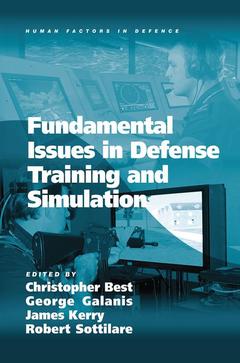Description
Fundamental Issues in Defense Training and Simulation
Human Factors in Defence Series
Authors: Galanis George, Sottilare Robert
Coordinator: Best Christopher
Language: English
Subjects for Fundamental Issues in Defense Training and Simulation:
Keywords
Synthetic Learning Environments; Instructor Operator Station; Computer Based Tutoring Systems; system; Adaptive Tutoring Systems; Lochlan Magee; Virtual Human; James Kerry; Performance Assessment; Brett Christensen; Training Effectiveness Evaluation; Remi Tremblay; Instructional Strategies Selection; Phil Wallace; Objective Performance Assessments; Winston Bennett; Model Training Effectiveness; George M; Alliger; Evaluate Training Effectiveness; Charles M; Colegrove; MECs; Michael J; Garrity; Transfer Effectiveness Ratio; Rebecca M; Beard; Virtual Training Environments; E; James Kehoe; Human Role Players; James A; Grand; Physical Fidelity; Steve W.J; Kozlowski; Performance Measurement Technologies; Rebecca Grossman; Constructive Simulations; Eduardo Salas; Designing Training Systems; Heather M; McIntyre; Psychological Fidelity; Ebb Smith; NATO Report; J.D; Fletcher; VE Training System; Robert A; Sottilare; Future Training Initiatives; Stuart Grant; Adaptability Training; Slawomir Wesolkowski; Work Domain Analysis; Kay Stanney; Meredith Carroll; Roberto Champney; Luke DeVore; Kelly Hale; Melissa M; Walwanis; Brandy L; Swanson; Beth F; Wheeler Atkinson; M; Beth H; Pettitt; Jack E; Norfleet; William Y; Pike; Rodney A; Long; Stephen Goldberg; Keith W; Brawner; Benjamin S; Goldberg; Heather K; Holden; John Hart; Jonathan Gratch; Stacy Marsella; Reid A; Bates; Nicole Cannonier; E.F; Holton III; Anya Andrews; Clint Bowers; Corina Lechin; Robert G; Abbott; Danielle C; Merket; Mark Schroeder; Brian Schreiber; Ashley Stephens; Philip Temby
68.67 €
In Print (Delivery period: 14 days).
Add to cartPublication date: 04-2017
· 15.6x23.4 cm · Paperback
205.30 €
In Print (Delivery period: 14 days).
Add to cartPublication date: 07-2013
331 p. · 15.6x23.4 cm · Hardback
Description
/li>Contents
/li>Biography
/li>
Dr Christopher Best is a Senior Research Scientist within the Air Operations Division of the Defence Science and Technology Organisation, Australia. He holds a PhD in psychology and his research interests include various aspects of human perception, cognition and learning. He currently leads a program of research on team performance and the use of simulation for training in the domain of military air operations. Dr Best has been an Australian national representative on the TTCP HUM Group Technical Panel on training since 2004. Dr George Galanis is currently the Scientific Advisor for the Australian Air Force. Prior to that position he was a Principal Research Scientist with the Defence Science and Technology Organisation in Australia. He has worked extensively in the field of simulation and training, including developing simulators for civil and military pilot training, and from 2001 until 2012 he was head of training research for the Australian Army. He was the Australian National Leader of the TTCP HUM TP2 Training Technology panel from 2001 until 2012 and chaired the panel from 2006 until 2009. Dr Galanis holds a PhD in Engineering and Human Factors and he is also a qualified pilot holding an Air Transport Pilot License with multi-engine instrument and instructor ratings. James Kerry is a Research Leader in the New Zealand Defence Technology Agency. He has considerable experience in the UK Armed Forces and more recently the NZ Defence Force and is currently involved exploring the effective transfer of training from the classroom to the 'field'. Kerry is the National Lead and former Chair of the TTCP HUM Group Technical Panel on training technology. Dr Robert Sottilare is the Chief Technology Officer at the US Army Research Laboratory’s SFC Paul Ray Smith Simulation & Training Technology Center, Orlando, Florida. He holds a PhD in Modeling & Simulation and his current research focus is in machine learning, learner modeling and the application of artifi




